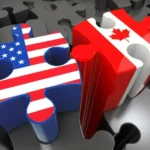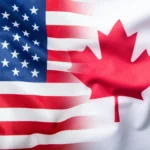
Mark Carney has taken office as Canada’s new Prime Minister under the shadow of intensifying economic pressure from President Donald Trump’s tariffs. Trump has recently escalated tariffs on most Canadian goods to 35%, increasing uncertainty across Canadian industries and adding to the risk of a recession. These trade actions are shaping not only Canada’s economy but also the political landscape and public sentiment as Carney asserts a defiant, pragmatic response focused on both firm retaliation and broad economic adaptation.
Table of Contents
Trump’s Tariffs: Impact on Canada’s Economy
President Trump’s latest rounds of tariffs have raised the duty on many Canadian exports from 25% to 35%. Key sectors affected include manufacturing, lumber, automotive, minerals, and agriculture, with ripple effects for supply chains and consumer prices on both sides of the border. The tariffs are expected to slow growth, increase business costs, and threaten thousands of Canadian jobs, even as exemptions under USMCA still protect about 85% of North American trade. At the same time, the Canadian dollar recently hit a four-month low due to oil price drops and investor anxiety over trade negotiations.
Mark Carney’s Response: Policy and Rhetoric
Prime Minister Carney has publicly condemned the tariffs as unjustified, expressing deep disappointment and affirming that Canada will “respond with intention and strength.” In recent months, Carney has balanced retaliation, such as maintaining or imposing counter-tariffs on select U.S. products, with pragmatic efforts to avoid further escalation. He has made clear that, while Canada will stand firm against U.S. pressure, the priority is now shifting to reduce Canada’s economic reliance on the U.S. by encouraging Canadian consumers and businesses to “buy Canadian” and to expand trade globally. Recent government support and incentives aim to help affected companies develop alternative products and find new international markets.
Canadian Public Sentiment
Public opinion has hardened significantly: the majority of Canadians support both government pushback against U.S. tariffs and boycotts of American goods and travel. Nationalism and pride in Canadian identity have surged, with mounting calls to diversify Canada’s economy away from U.S. dependence. This has also bolstered Carney’s position, with recent polls showing him as the leader most trusted to manage the economic crisis.
Shifting Political Dynamics
The trade war has galvanized Canadian politics, and support for Carney’s Liberal Party has strengthened, while the Conservatives, under Pierre Poilievre, have lost momentum amid criticism of being too accommodating to Trump. Other parties, including the NDP and the Bloc Québécois, have seen a decline in support. The recent economic crisis has also encouraged interprovincial unity and a renewed push to remove internal trade barriers.
Forward Outlook and What’s Next
Carney has warned that “dark days” are possible if the trade conflict drags on, but insists that a clear national strategy, prioritizing what Canada can control, will be essential. Talks with the U.S. remain tense, with no clear path to a swift resolution. Carney’s government is using the moment to pivot toward more diversified trade, invest in domestic industries, and encourage Canadian-made alternatives for both businesses and consumers.
In summary, the situation remains volatile. Ottawa’s resolute stance against U.S. tariffs under Mark Carney is reshaping not only Canada’s economy but also its political and social fabric, ensuring that this issue will define his early tenure as Prime Minister.
As tariffs and markets shift, your mortgage shouldn’t add stress.
Cannect offers refinancing, renewal, and debt solutions to help you maintain financial security.
Call us at 416-766-9000 today.
For more info, watch MAKE MONEY COUNT
Last updated on 01/10/2025
















No Comments